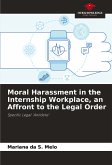The present study analyses the practice of moral harassment in labour relations, in order to provide an investigation in search of justifications for the elaboration of legislation at the federal level that disciplines the subject. It analyses the context of the problem where labour bullying is inserted and its transformative character in society, pointing out the main differences between this practice and sexual harassment. Addresses the consequences of bullying to the worker, especially with regard to physical and psychological health. It studies the dignity of the human person as an alternative principle for the protection of the working class, investigating how it applies in the labour sphere, as well as the influence of a healthy working environment in guaranteeing dignity. It investigates Brazilian laws and foreign legislation disciplining labour bullying, seeking to draw an understanding of the evolution of the phenomenon studied. It concludes that priority should be givento the drafting of a specific federal law governing workplace bullying, justified by the need for broad protection of workers in this context.
Bitte wählen Sie Ihr Anliegen aus.
Rechnungen
Retourenschein anfordern
Bestellstatus
Storno








